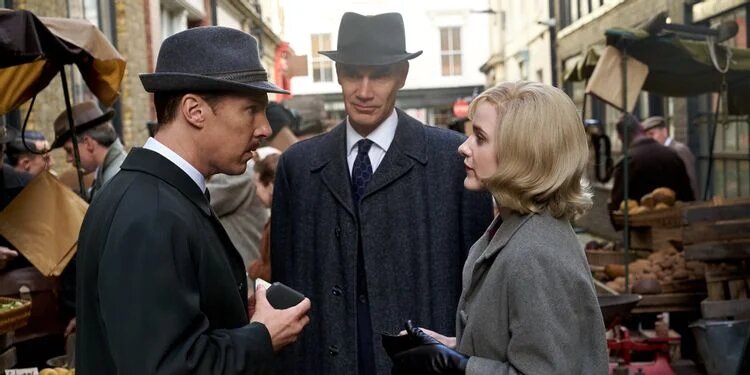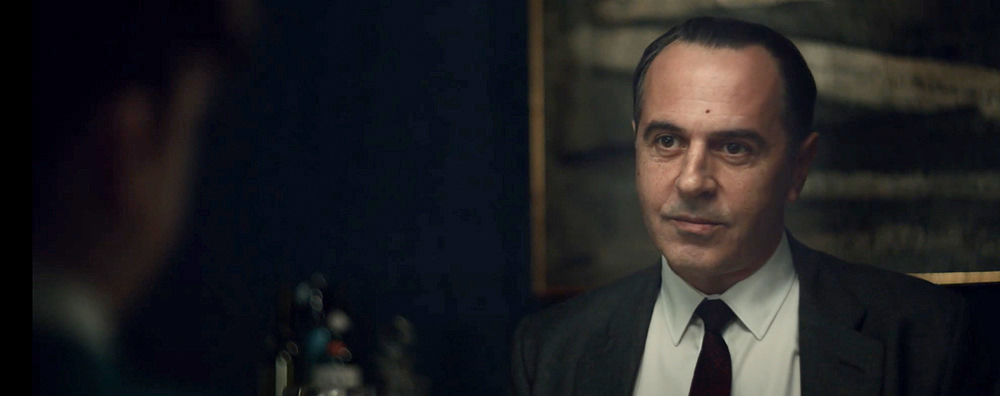Based on a true story, THE COURIER takes us back to the Cold War and the palpable threat of nuclear annihilation. Once again, we are reminded that it was as much luck as it was diplomacy or mutually assured destruction that prevented World War III. In this case, the good luck of two people for whom politics meant less than doing the right thing coming together by either chance to fate. If they hadn’t, so the film posits, the Cuban Missile Crisis might not have turned out so well.
We begin in 1960, and Soviet Premier Nikita Khrushchev (Vladimir Chuprikov) railing against the Imperialist West and bragging that they fear the might of the Soviet nuclear arsenal. The camera pans slowly across the usual rows of grey government functionaries smiling and applauding on cue. It stops on one man, Oleg Penkovsky (Merab Ninidze) also smiling and applauding, but unmistakably troubled. We will learn in the course of the film that he is a war hero and a patriot, but one who is concerned about Khrushchev’s erratic, impulsive nature. He fears that the Premier will start a war and, even knowing the consequences of being caught, determines to give top secret information to the West.

Benedict Cumberbatch, Angus Wright, Rachael Brosnahan
Meanwhile in England, Greville Wynne (Benedict Cumberbatch) is throwing a golf game in order to make a sale. It fails, and as he commiserates with his wife, Sheila (Jessie Buckley), he notes that there are only a few more decades of hollow flattery to get through until retirement. Little does he realize that being an out-of-shape middle-aged salesman who drinks a little too much, but who has business contacts in the Soviet Bloc, makes him the perfect candidate to be the eponymous courier to help Penkovsky get his information out of the Soviet Union. He’s rightly bemused when approached by CIA agent Emily Donovan (Rachel Brosnahan) and her British counterpart Dickie Franks (Angus Wright) to make a business trip to Moscow. At first, his mission is merely to make contact, a task made relatively simple by Penkovsky’s position as the head of the Scientific Research Committee and Wynne’s trade in machine parts. But the information proves to be of such a top secret military nature that plans to drop Wynne are discarded, and the operation becomes more dangerous for everyone the longer it continues.
The film is an elegant exercise. The direction has style, while the story has substance, and not a little wit. When presented with a tie-clasp and told to wear it at all times in Moscow, Wynne asks is it is a weapon, and seems disappointed when told it isn’t. It’s merely the signal to Penkovsky that Wynne is his contact. The subtleties of the spy game, tradecraft as it’s called in the spy business, are laid out, including the classic warning to trust no one, and that lip readers, electronic bugs, and KGB agents are everywhere. There is also the amoral nature of the game itself. When Wynne is reluctant to join in, the psychologically astute Donovan calculates what Wynne’s weak spot is and goes in for the kill by making the prospect of nuclear war a very personal. Writer Tom O’Connor suffuses the dialogue with the half-truths and subtexts of unanswered questions in which both spies and their governments engage.

Merab Ninidze
The less subtle aspects are laid out as well. A traitor is shot in the head in front of a group that includes Penkovsky as a warning about what happens to traitors. It’s the image that springs to mind when he tells Wynne that he’s betting his life on him. It’s the image that springs to mind, too, when Penkovsky is paid a seemingly casual visit by a functionary questioning him about Wynne in a conversation that on the surface is almost trivial, but whose intent is pure menace. Ninidze delivers a performance of quiet power here and throughout, playing a man who has spent his life concealing his emotions, and catching the small tells as the increasing uncertainty of his position, and the mission, increases. When he begins to let down his guard with Wynne, it is a monumental moment, though the drama is all in the way his voice changes ever so slightly while talking about otherwise banal things.
Wynne himself may not seem the challenging character to play at the start, but Cumberbatch doses him with just the right amount of self-aware irony to make the ordinary businessman interesting. As events progress, and Wynne becomes moody and secretive with his wife, placing a strain on his marriage, Cumberbatch doesn’t overplay it. The impulse to continue being the courier for the good of the planet, as well as for the Russian who is now his friend, is never in question, but the pain it causes is plain. In a beautifully written scene, when Wynne is packing for his last trip to Moscow after promising Sheila that he was finished traveling, she quietly tells him that he should go to a hotel that night. Cumberbatch is perfectly still, but still somehow reveals that the emotional wind has been knocked out of Wynne.
The last third of THE COURIER is where the action picks up as the stakes become higher. An intricately planned escape for Penkovsky and his family is suitably tense, and sharply edited. Avoiding spoilers, all I will say is that the aftermath is brutal, with the full wrath of the Soviet Union on full display, and permits Cumberbatch to show the unraveling of Wynne without losing his moral certitude.
It is the human connection between the two men that is the heart of the film. At one point, Penkovsky visits Wynne’s home for dinner, and explains to his son that it’s only the politicians of their respective countries that hate each other. A little heavy handed, but certainly well-intentioned in a story that celebrates two men doing something extraordinary no matter the cost.
Your Thoughts?